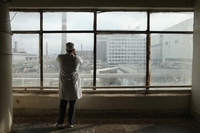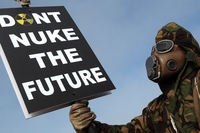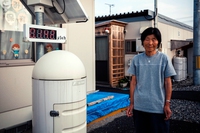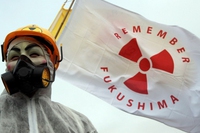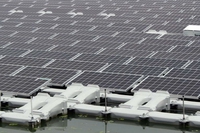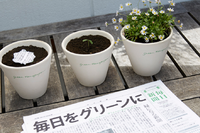
Shuji Nakamura. The best is yet to come in the universe of LEDs
Shuji Nakamura, premio Nobel per la Fisica, è stato a Como in occasione del Festival della Luce. L’inventore dei Led ha svelato a LifeGate come sarà la luce e l’energia del futuro.
Shuji Nakamura, premio Nobel per la Fisica, è stato a Como in occasione del Festival della Luce. L’inventore dei Led ha svelato a LifeGate come sarà la luce e l’energia del futuro.
Sunao Tsuboi, 91, is a Japanese man who survived the atomic bombing of Hiroshima on the 6th of August 1945. For this reason, it’s quite impressive to hear Tsuboi’s optimistic words – reported by Japanese news website NHK – on US President Barack Obama’s visit to the Japanese city. This is part of his Asian tour
The 26th of April 1986 is still an indelible date in the minds of millions of people around the world. The explosion that destroyed reactor number four at the Chernobyl Nuclear Power Plant in the former Soviet Union changed people’s perception of nuclear power forever, making them question its safety. Controversy regarding the death toll
L’allarme del presidente dell’Autorità francese per la Sicurezza Nucleare, a cinque anni dal disastro di Fukushima. Ecco le centrali transalpine a rischio.
Secondo due Ong di medici e scienziati americani, le radiazioni di Fukushima causeranno decine di migliaia di malati di cancro in più rispetto al normale.
Five years have passed since the 11th of March 2011, when one the most devastating natural disasters of our decade took place in Japan. The Fukushima Daiichi Nuclear Plant accident was the consequence of a 9.0 magnitude earthquake, so strong that it permanently moved Japan’s main island more than two metres to the east, which
Due to the lack of soil for the construction of PV plants, the Japanese company Kyocera has thought to build one on a water reservoir. This is the result.
A population of cats of any race and colour lives or better rules the mile-long Aoshima Island, in the Ehime prefecture, Southern Japan. In 1945, a small colony of cats was introduced to oppose the presence of mice that were plaguing fishermen’s boats. At that time, 900 people inhabited the island. Today, proportions have changed. Felines increased
In Japan, one of the most famous national dailies invented a one hundred percent sustainable newspaper. If you plant it, it will bloom!
If you’ve never heard about the dugong, don’t worry. It is one of the least known marine mammals – very similar to Florida’s manatee – and a shy creature populating the Pacific and Indian Oceans. The calm waters surrounding Okinawa Island, Japan, are home to this rare mammal species, which is particularly dear to the

